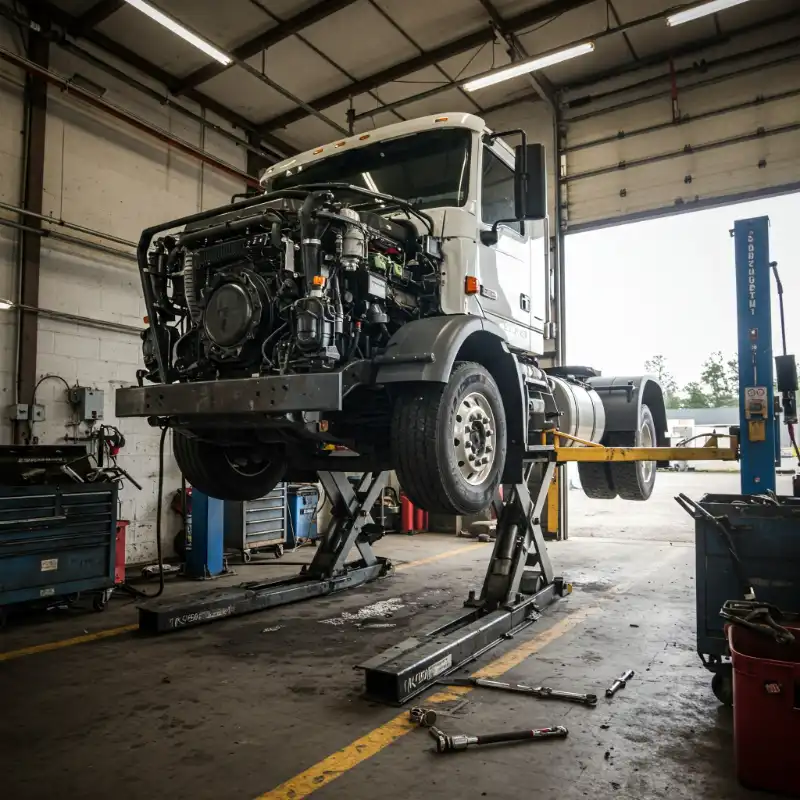Most trailer breakdowns can be avoided with proactive maintenance and a sharp eye for trouble spots.
Tire Failures: The #1 Breakdown Culprit
Tires are the most common cause of trailer breakdowns, and for good reason. The sheer weight and long hours on the road put immense strain on them.
How to Prevent Tire Blowouts:
- Check Tire Pressure Daily – Underinflated or overinflated tires lead to uneven wear and increased blowout risk. Stick to manufacturer-recommended PSI levels.
- Inspect for Damage – Cuts, bulges, and tread separation are warning signs that a tire is nearing failure.
- Rotate and Replace – Regular tire rotations and replacements prevent uneven wear. Don’t forget to check the spare!
- Mind the Load – Overloading the trailer increases pressure on the tires, leading to premature failure. Always follow load ratings.
Brake System Failures
A failed trailer brake system is a recipe for disaster, leading to accidents, fines, and vehicle downtime.
How to Keep Trailer Brakes in Top Shape:
- Inspect Air Lines and Chambers – Air leaks in the brake system cause delayed stopping power. Look for cracked or worn hoses.
- Check Brake Shoes and Drums – Worn-out brake shoes reduce stopping efficiency. If you hear grinding, it’s time for an inspection.
- Test Emergency Brakes – The emergency brake system should activate properly when disconnected from the truck.
- Drain Air Tanks Regularly – Moisture buildup in air tanks can freeze in colder weather, leading to brake failure.
Suspension System Issues
A bad suspension leads to poor handling, cargo damage, and extra strain on other trailer components.
Preventative Measures for Trailer Suspension:
- Inspect Leaf Springs – Broken or cracked leaf springs cause uneven weight distribution and potential axle failure.
- Check Shock Absorbers – Worn-out shocks lead to excessive trailer bounce, increasing wear on tires and brakes.
- Tighten U-Bolts and Hangers – Loose or corroded suspension components can lead to catastrophic failures if left unchecked.
Electrical System Failures
Lights flickering? ABS fault light on? Your trailer's electrical system could be on the fritz.
Avoid Electrical Failures with These Steps:
- Inspect Wiring Harnesses – Loose, damaged, or corroded connections cause lights and braking systems to fail.
- Check Battery and Grounding Points – A weak or corroded ground connection leads to electrical malfunctions.
- Protect Against Moisture – Water intrusion leads to short circuits and corroded connectors. Use dielectric grease and sealed connectors.
- Test Lights and ABS System Before Every Trip – Don’t assume everything is working—verify before hitting the road.
Kingpin and Fifth Wheel Connection Problems
A worn or improperly locked kingpin can lead to dangerous trailer detachment.
How to Keep Your Kingpin and Fifth Wheel in Good Shape:
- Inspect for Wear and Damage – A worn-down kingpin increases the risk of detachment. Look for cracks and excessive wear.
- Ensure Proper Lubrication – Grease the fifth wheel plate and locking mechanism to prevent binding.
- Check Locking Jaw Engagement – Always verify that the fifth wheel is fully locked before moving.
Trailer Door and Latch Failures
A faulty trailer door can lead to lost cargo and DOT violations.
Prevent Trailer Door Failures:
- Check Hinges and Latches – Rusted or damaged hinges prevent doors from closing properly.
- Lubricate Moving Parts – Reduce wear and tear on door rollers and latches with regular lubrication.
- Inspect Weather Seals – Worn-out seals let in moisture, damaging cargo and trailer interiors.
Cooling and Reefer Trailer Malfunctions
For refrigerated trailers (reefers), keeping cargo at the right temperature is crucial.
How to Prevent Reefer Breakdown:
- Check Refrigeration Unit Fuel and Oil Levels – Low levels can cause unit shutdown.
- Monitor Temperature Sensors – A faulty sensor leads to inaccurate temperature readings.
- Inspect Insulation and Seals – A damaged seal can let in warm air, reducing cooling efficiency.
- Perform Pre-Trip Inspections – Run the unit before loading to ensure proper function.
Preventive Maintenance: Your Best Defense
A well-maintained trailer is a reliable trailer. Routine preventive maintenance reduces breakdown risks, extends equipment life, and keeps you compliant with DOT regulations.
Trailer PM Checklist:
✔ Daily Walkaround Inspections – Check tires, brakes, lights, and connections before every trip.
✔ 90-Day BIT Inspections – Ensure compliance and catch small issues before they turn into major problems.
✔ Quarterly Brake and Suspension Inspections – Prevent costly failures before they happen.
✔ Annual DOT Inspection – Stay compliant and avoid fines with thorough yearly checks.
Protect Your Cargo
With regular maintenance, thorough inspections, and a keen eye for early warning signs, you can keep your trailer rolling without unexpected surprises.
Need professional trailer maintenance in San Antonio, Dallas, Houston, or Austin? Contact OTR Fleet Service today and keep your fleet road-ready!










.webp)





























